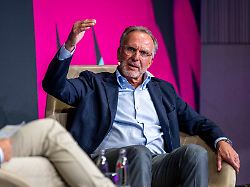German football is threatened with a bang
Karl-Heinz Rummenigge increases the explosive power
6/2/2023 3:34 p.m
Extreme risk of explosion: Bayern returnee Karl-Heinz Rummenigge also openly questions the solidarity model of central marketing in the Bundesliga. More than ever, the German Football League seems to be torn apart by very different interests.
At some point Karl-Heinz Rummenigge only spoke contemptuously of the “16”, as if it were a gang of scoundrels. 16 clubs that prevented the multi-billion dollar investor deal in the German Football League (DFL) – they would have, rumbled the returnee to the Bayern Munich supervisory board, “thrown down the gauntlet” at the industry giants, yes, even the solidarity model of central marketing in German professional football. terminated”.
Rummenigge’s 45-minute appearance at the “SPOBIS Conference” sports business fair in Düsseldorf was remarkable in many ways. Like Hans-Joachim Watzke, boss of Borussia Dortmund and the most prominent DFL champion of investor entry, the 67-year-old was noticeably grumpy. This rebellion is “behavior without solidarity”, with brutal consequences. “That should be interpreted in such a way that you almost have to recommend to your club: We’ll be out of the cartel in the next tender, we’ll market ourselves,” Rummenigge threatened.
No more demands for solidarity!
More than ever, the DFL seems to be torn apart by very different interests. What does Eintracht Braunschweig care about the international competitiveness of the giants that can never be caught financially anyway? The little ones don’t want to be intimidated, the big ones don’t want to be the feeders anymore – it’s a huge earthquake with unforeseeable consequences. “Aki Watzke also announced that: ‘No one should come to me with demands for solidarity’,” emphasized Rummenigge.
So: “The distribution battles will possibly increase in intensity,” he suspected. A consensus has always been reached, but “the sign of 16” makes it more difficult: Rummenigge did not want to rule out a separation between the first and second divisions as a consequence, “even if I personally don’t want that”. On May 24, 11 out of 36 clubs voted against going to the next phase in the search for an investor, with 5 others abstaining. The two-thirds majority given by the DFL itself as the minimum mark for support was therefore missed.
Bundesliga “disastrously positioned”
From Rummenigge’s point of view, the investor deal could have closed a very dilapidated construction site. Axel Hellmann from Eintracht Frankfurt, Oliver Leki from SC Freiburg or Watzke “would have worked incredibly hard to keep the percentage (of the rights sold, ed.) low and generate an outcome of two billion. That would be a proud one result that would have opened up perspectives for German football and made visions possible,” he emphasized. After all, the Bundesliga is “disastrously positioned”, especially in foreign TV marketing.
“We once had a forecast of 850 million euros per year,” reported Rummenigge. “Do you know where we are now? At 160. This money is particularly important for clubs that play internationally. That’s largely gone from the big clubs, it’s missing from every cash register – even at Bayern Munich.” However, given the dizzying transfer prices and salaries, especially in England, the “rat race” cannot be won for the league anyway: “You only work from morning to night for the cash register of the players and consultants.”
Rummenigge did not reveal how the exit could succeed. Not even where the urgently needed money is to come from: “We will certainly not play along with taking out a loan of 700 million.” A well-prepared punch line followed. Because then the stable clubs might have to be held liable for other clubs – but he didn’t want to name “any names in the capital”.
